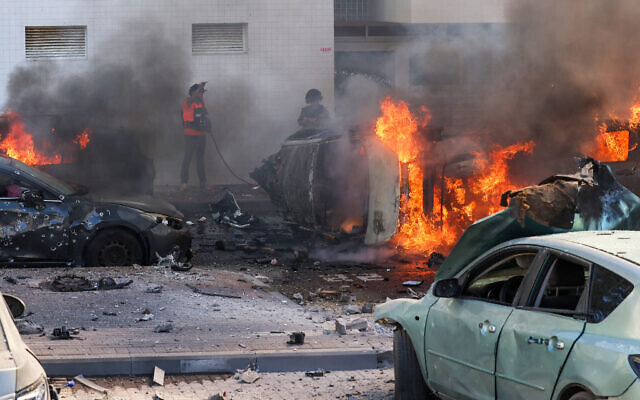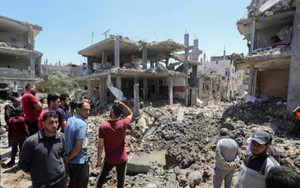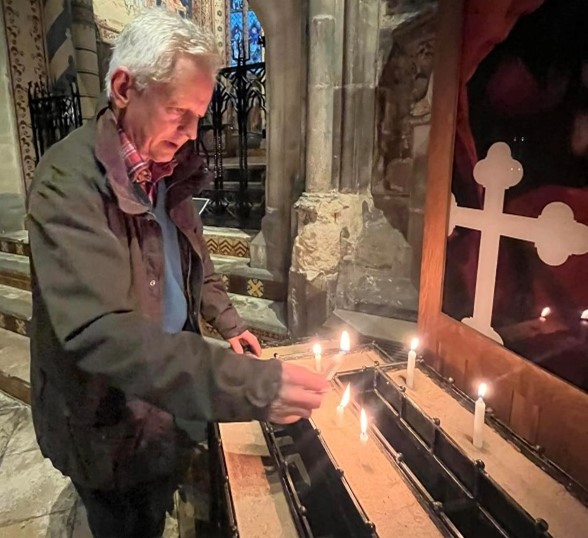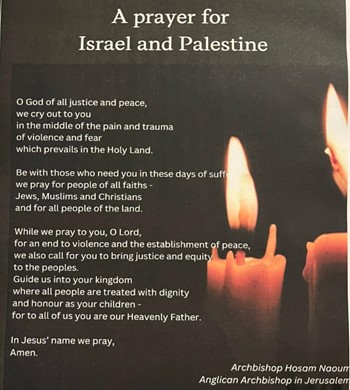
Strike on Ashkelon, southern Israel

Rubble of building in Gaza City
The appalling, ghastly events in first Israel and then Gaza bring alive the fragility of the Middle East region.
Go back a decade and in 2013 I was among those who told then PM David Cameron that I did not support a missile attack on Syrian airfields to prevent Syrian leader Assad from airborne chemical weapon attacks on his own people.
I did not believe that our objectives were clear, or that we should be involved in the Middle East’s wars. In the event the then PM, now Foreign Secretary, did not push for intervention of any kind but the massacres and death toll continued, nonetheless.
Some 600,000 people have died so far in that long running Syrian tragedy, but no-one in Britain, including in Gloucester, at any time called for a ceasefire, or sought a council motion to ask me to seek a ceasefire. I believe this was not least because people recognised that we had no power to achieve this if those fighting had no wish to stop.
Contrary to what some people believe, no third-party nation in the world can prevent civil war - as has been seen across the world time and time again. Invasion of another sovereign state is different (e.g: Russian Invasion of Ukraine); but relationships between Gaza, Israel, and the Occupied Palestinian Territories (OPT) are different and more complicated. And this turmoil started with an invasion of a sovereign member (Israel) by an organisation which is a proscribed terrorist group in the UK – Hamas.
Gaza is different
In one way, everything is the same – an intractable power struggle underpinned by geopolitical jockeying as well as cultural and religious differences: and in another, everything is different.

Left: Looking at damage in Gaza in 2010 with cross-party colleagues and UNWRA
Right: Prayers before football at a Gaza school in 2010
The historical context matters
At the heart of the struggle between Israel and Hamas is the failure since 1947 of either war or political negotiation to achieve the two-state solution (ie Israel and Palestine as separate viable states living beside each other in peace) that so many of us want to see.
Why has this been so difficult to achieve?
It all starts with the secret 1916 Sykes-Picot Agreements (UK/France) which set out ‘spheres of influence’ should the Ottoman Empire collapse post WW1 (as it did).
The agreement allocated to the UK what is today southern Israel and Palestine, Jordan and Southern Iraq: whereas modern Syria, Lebanon and Kurdistan were for French influence. Much of Palestine became part of the League of Nations British Mandate for Palestine until 1948.
Meanwhile however, the Balfour Declaration (by then Foreign Secretary Arthur Balfour) in November 1917 gave support “for the establishment in Palestine of a national home for the Jewish people”. This was the beginning of Israel.
Less well remembered is the second half of the letter, which stated that “nothing shall be done which may prejudice the civil and religious rights of the existing non-Jewish communities in Palestine”.
These two commitments have been at the forefront of all conflict since: the reason why the new agreement in 1947 attempted an equitable division of land between Israel and Palestine, the several wars, intifadas, walls, illegal settlements in the West bank part of the Occupied Palestinian Territories (OPT), failed negotiation, release of Gaza by Israel in 2005, the rise of Hamas in Gaza and their split with Fatah who control the Palestinian authority, and all the mounting conflict between Hamas and Israel since.
Creating the two states means a division of land which (for reasons too complicated for this short piece) has never been agreed: although proposals under US President Clinton’s mediation in 1992 came closest, and many might rue the day that Yasser Arafat walked away from them.
The Situation Now
I saw the remains and impact of the 2009-10 conflict in Gaza in 2010. It was bad and today is many times worse. I have no doubt about the horrors of the invasion of Gaza, or the horrors of war on both sides, although not remotely equally: the scale of damage in Gaza is on par with Homs or Aleppo in Syria.
Today, a decade on, and the invasion of and hostage taking from Israel by Hamas on October 7th was followed by a predictable, full-scale invasion of Gaza by Israel with ghastly humanitarian consequences.
Our best chance of peace comes when both sides recognise that they cannot destroy each other: and that they need a political agreement.
The first ray of hope came last week babies born prematurely were moved to safety from Gaza through the Rafah crossing. Now quiet diplomacy, not least by the UK and Qatar, has brought about a humanitarian pause of several days with aid going in and hostages/foreign citizens coming out.
This is the start to creating an environment where fighting stops and the talking starts.

Listening to and engaging with demonstrators outside my office
Could a ceasefire happen?
If that pause comes to past it may lead to a ceasefire - we live in hope. If it does, no-one will be happier than I and all MPs who have (wholly unjustly) been accused of being responsible for murder and genocide by some constituents.
But I do come close to despair when I read the Hamas spokesman saying that they will attack again and again like October 7th until Israel is ‘annihilated’, that Israel won’t stop until Hamas is destroyed; and meanwhile unacceptable Israeli settler and IDF violence and killings in the West Bank continue.
And having met some of the regional leaders, I’m also aware of the geopolitical complexities that explain why Palestine’s neighbours have not made any proposals yet to provide refuge to Gaza residents, or for Egypt to open the Rafah crossing much more freely.
Hamas and their Iranian masters are not at all welcomed in neighbouring Sunni Muslim states, and peace in a two-state solution will never be possible with Hamas ruling Gaza.
So, a ceasefire means different things to different people, and is incompatible with either Israel or Gaza’s current aims.
Which takes us to a longer-term solution – surely what every human must see as essential to human life, in both Gaza and Israel.
What could be the future?
Whether somehow the Palestinian Authority can take over Gaza and with a huge UN led programme restore Gaza and link the two (‘from the river to the sea’) in a viable Palestinian state that brings peace and prosperity to Palestinians, while allowing a smaller Israel to continue in peace is the key question that has to be considered.
That peace has been elusive for almost 80 years, invariably faltering when it comes to agreement over Jerusalem. But maybe, just may be, this time will be different because it has to be.
This is what the UK must help work for. It is very timely that David Cameron comes back to government on an issue so familiar to him from John Kerry/William Hague’s efforts a decade ago. They too failed to bridge the intractable gap between Israel and Palestine and the compromises needed on both sides. Can a new effort, with the UK strongly involved, do better today?
We must be trusted by both sides, and while we prepare for that it isn't helpful to take sides or pass motions for ceasefires. We must work to stop the fighting for as long as possible now, and then work for a ceasefire to be the outcome of talks when everyone realises war alone cannot deliver the solutions either side imagines it wants. Civilians deserve peace and talks, and while the UK and other nations work together to deliver that, we in the UK must avoid replicating the divisions of the middle east on the streets of Gloucester.

Lighting a candle for all civilians who have suffered - and for an end to fighting and talks for a lasting peace

Best regards

P.S Do let me know if you have any questions or different views you want to share with me
